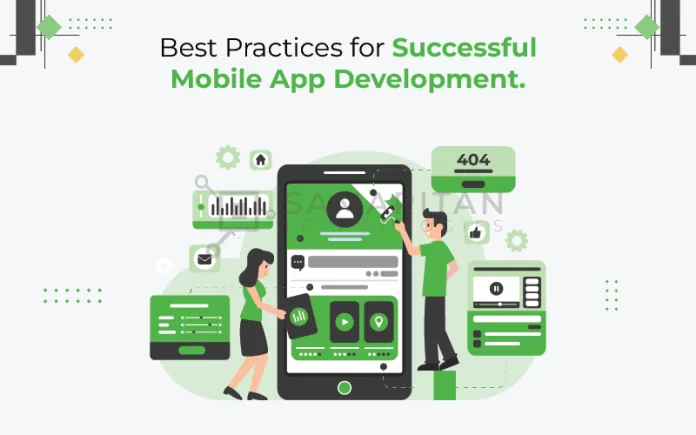Mobile app development services has emerged as a highly profitable field, presenting a wealth of opportunities for entrepreneurs. In today’s digital age, where smartphones have become an integral part of our lives, mobile apps have transformed various industries and revolutionized the way businesses operate. This article explores why mobile app development is a lucrative field for entrepreneurs, covering key aspects such as its definition, contributing factors, revenue generation, best practices, and potential avenues for success.
What is Mobile App Development?
The process of developing software applications tailored for mobile platforms, such as smartphones and tablets, is known as mobile app development. These applications are designed to provide users with a variety of features, including social networking, e-commerce, and entertainment and productivity tools. Mobile app development services has developed into a crucial sector that gives businesses the ability to interact with consumers, streamline operations, and expand into new markets as a result of the widespread use of smartphones and the rising reliance on mobile technology.
Which Factors Contribute to the Lucrativeness of Mobile App Development?
Several factors make mobile app development a highly lucrative field for entrepreneurs. Firstly, there is an ever-increasing demand for mobile apps, driven by the continuous expansion of the smartphone market. As more individuals adopt smartphones, the need for innovative and user-friendly apps grows exponentially. Additionally, changing consumer behavior, with a significant shift towards mobile-centric activities, presents immense business opportunities for app developers.
How Does Mobile App Development Generate Revenue?
Mobile app developers have multiple avenues to generate revenue. One common strategy is through in-app purchases, allowing users to unlock premium features or access exclusive content within the app. Advertising serves as another lucrative revenue stream, where developers can partner with brands to display targeted advertisements to their user base. Subscription-based models provide a recurring revenue stream, offering users premium access to app features or content for a subscription fee.
Best Practices for Successful Mobile App Development:
To ensure successful mobile app development, it is crucial to follow best practices throughout the process. Thorough market research is essential to understand the target audience and their needs. By adopting a user-centric approach, prioritizing user experience (UX), and creating an intuitive and engaging interface, you can increase user satisfaction and app engagement.
Developing the app to be compatible with multiple platforms expands its reach and potential user base. Implementing an agile development methodology allows for flexibility, frequent feedback, and iterative improvements. Building a robust backend infrastructure ensures efficient data management and scalability. Performance optimization is vital for fast loading times, smooth transitions, and minimal resource consumption. Regular updates and maintenance based on user feedback and market trends keep the app relevant and competitive.
App Store Optimization (ASO) techniques improve the app’s visibility and discoverability. Prioritizing security and data privacy builds user trust. Utilizing analytics tools provides valuable insights for data-driven decision-making. By following these best practices, you increase the likelihood of creating a successful mobile app that meets user expectations and achieves business objectives.
Where Can Entrepreneurs Find Opportunities in Mobile App Development?
Entrepreneurs can find opportunities in mobile app development through various avenues. Here are a few key areas to explore:
Niche Markets: Identify niche markets that are underserved or have specific needs that can be addressed through mobile apps. Research industries such as healthcare, education, finance, or transportation, and look for gaps where innovative mobile solutions can make a significant impact.
Targeted Demographics: Consider targeting specific demographics or user segments that have unique app requirements. For instance, apps catering to senior citizens, parents, fitness enthusiasts, or professionals in specific industries can provide valuable solutions tailored to their specific needs and preferences.
Geographic Regions: Explore opportunities in specific geographic regions or countries. Analyze local trends, cultural aspects, and market gaps to develop apps that cater to the specific needs and preferences of the target audience in those regions.
B2B Collaboration: Collaborate with businesses that require custom app solutions. Many companies may need mobile apps to enhance their operations, improve customer experiences, or streamline internal processes. By offering customized app development services, entrepreneurs can tap into this market and build long-term partnerships.
Emerging Technologies: Keep abreast of new developments in technologies like augmented reality (AR), virtual reality (VR), artificial intelligence (AI), and the Internet of Things (IoT). These technologies provide the distinctive potential for entrepreneurial endeavors by opening up new options for creating mobile apps across many sectors.
App Reselling and White-Labeling: Consider reselling or white-labelling existing apps or app templates. Some app developers offer ready-made solutions that can be customized and rebranded for specific businesses or industries. This approach can provide a quicker entry into the market and reduce development costs.
App Store Optimization (ASO) Services: Provide App Store Optimization services to app developers and businesses. ASO is the process of optimizing mobile apps to rank higher in app store search results. By offering expertise in ASO techniques, entrepreneurs can help clients increase app visibility, organic downloads, and user engagement.
Conclusion:
Mobile app development presents a thriving and lucrative field for entrepreneurs. The combination of increasing demand, evolving consumer behaviour, and diverse revenue generation options creates a fertile ground for success. By adhering to best practices, conducting thorough market research, and identifying niche markets or partnership opportunities, entrepreneurs can harness the potential of mobile app development and unlock immense growth in this dynamic and ever-expanding industry.
